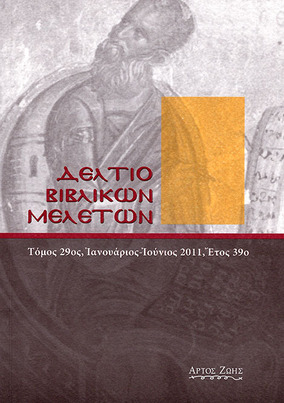Η επιχειρηματολογία του πρώτου χριστιανικού κηρύγματος για την ανάσταση του Χριστού
Part of : Δελτίο βιβλικών μελετών ; Vol.21-22, 2003, pages 263-294
Issue:
Pages:
263-294
Parallel Title:
The argumentation of the early Christian kerygma for the Christ’s resurrection
Author:
Abstract:
At the first century AD the matter of the resurrection from the dead was for the pagans a thing unacceptable but desirable and for the Jews a thing confused but hoped for. How the first preachers of Jesus Christ ’s resurrection presented then this preaching and which arguments did they use in order to call for believing in it their audience? Seven speeches in Acts of the Apostles contain the preaching on Christ’ s resurrection, as St Luke constructed it comprising and elaborating the primitive apostolic tradition. By using the method of classical rhetorical analysis we have discern the elements of the argumentation for the preaching on resurrection and we have realize the functionalism of each one within the kerygma. By using the form-critical method we have identify the same elements in the earliest kerygmatic material, which is incorporated in Epistles and in Gospels. So we infer that the argumentation of the early Christian kerygma was one and uniform, and it included these proper points: as to Jews the historical personality of Jesus Christ and the fulfillment of the Old Testament prophesies concemig Messiah, who ought to have suffered and to have risen; as to pagans, the evidence of the creation for a beneficent God and the historicity of his delegate Jesus Christ. In other words, the early kerygma on Christ’ s resurrection included history and theology. However, the force of the arguments depended on the intention of the audience. The pagan intellectuals in Athens interrupted St Paul’ s speech and they laughed at his preaching on the resurrection. Similarly, the learned leaders of Israel in Jerusalem rejected the apostles’ proclamation for risen Jesus. The arrogance and the self sufficiency undermined any argumentation.
Subject:
Subject (LC):
Notes:
Περιέχει σημειώσεις, Τιμητικό αφιέρωμα στον καθηγητή Σάββα Αγουρίδη




